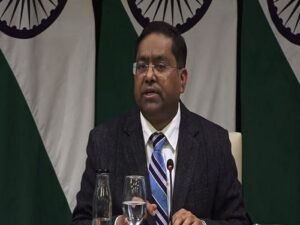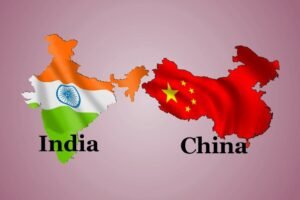India on Thursday rejected the references to Jammu and Kashmir in a joint statement of China and Pakistan as ‘unwarranted’.
China-Pakistan joint statement was issued in Beijing on June 7 following talks between Pakistan Prime Minister Shehbaz Sharif and Chinese Premier Li Qiang.
“We have noted unwarranted references to the Union Territory of Jammu & Kashmir in the joint statement between China and Pakistan of 07 June 2024,” Ministry of External Affairs (MEA) spokesperson Randhir Jaiswal said in response to questions from the media regarding references to Jammu & Kashmir in the joint statement between China and Pakistan.

Pakistan said in a joint statement that it has informed China on the most recent developments regarding the situation in Jammu and Kashmir.
Reiterating that the Jammu and Kashmir conflict is a holdover from history, the Chinese side called for a proper and peaceful resolution in line with the UN Charter, pertinent resolutions of the UN Security Council, and bilateral agreements. But India has repeatedly disapproved of these united remarks from Pakistan and China.

Ministry of External Affairs (MEA) vehemently opposes and rejects any actions taken by any nations that will undermine country’s sovereignty and territorial integrity by supporting or legitimizing Pakistan’s unlawful occupation of these regions.
India and China

Contemporary Relations of India-China:
-
- China and India are major regional powers in Asia, with large populations and fast-growing economies.
- Between 2008 and 2021, China was India’s largest trading partner, and both countries extended strategic and military ties.
- However, conflicts of interest persist. India faces a trade deficit favoring China, and border disputes remain a point of contention.
- The Sino-Indian War of 1962, border clashes, and the 1987 Sumdorong Chu standoff have marked their relationship.
- Despite tensions, diplomatic and economic ties have been rebuilt since the late 1980s.
Current Border Dispute between India-China:
-
-
- The root cause of tension lies in the ill-defined, 3,440 km (2,100-mile)-long disputed border.
- Rivers, lakes, and snowcaps along the frontier make the line shift, leading to confrontations.
- Infrastructure development along the border exacerbates the situation.
- The 2020 clash near the Tawang sector of Arunachal Pradesh resulted in casualties.
- Both countries have much to lose, given their nuclear capabilities and economic ties.
-
India and Pakistan Relations

Recent Developments:
-
- In 2019, the bilateral relationship was strained by events like the Pulwama terror attack and the Balakot airstrike.
- The scrapping of Jammu and Kashmir’s special status further heightened tensions.
- Efforts to improve bilateral ties have been hampered by terrorist attacks and ceasefire violations2.
Shared Past and Future Prospects:
-
- Despite the rocky history, India and Pakistan share linguistic, cultural, and geographic links.
- Their relationship remains fragile, but discussions about economic, social, and cultural ties can pave the way for future cooperation.
- Stabilizing South Asia and improving both nations’ economies depend on finding common ground and fostering political will.
Sino-Pak relations

- Diplomatic Relations: Pakistan has consistently supported China’s position on various international issues, including the Kashmir conflict. In return, China has supported Pakistan’s stance on the Xinjiang controversy, the Tibetan sovereignty debate, and the political status of Taiwan.
- Military Ties: The People’s Liberation Army and the Pakistan Armed Forces share a notably close relationship.
- Economic Cooperation: China and Pakistan have cooperated extensively, with China moving forward to improve Pakistan’s civil nuclear power sector.
- Foreign Policy: Maintaining close relations with China remains a central part of Pakistan’s foreign policy.
This issue highlights the geopolitical complexities in the region and underscores India’s unwavering stance on the integral status of Jammu and Kashmir within its borders.











Comments 1